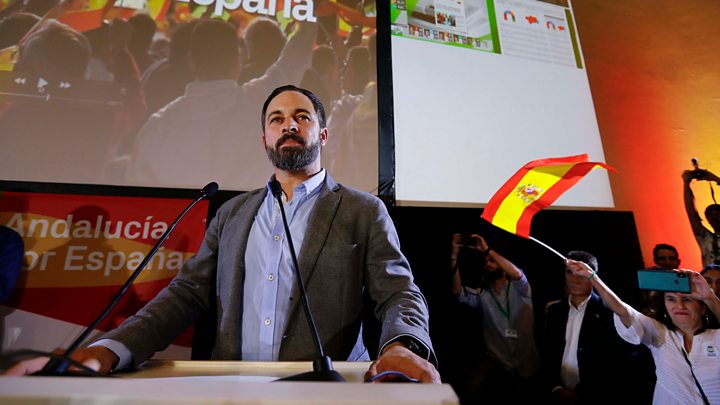[ad_1]

Image copyright
Getty Images
Vox leader Santiago Abascal said he wanted to build “a patriotic alternative” for Spain
After decades without making an impact on Spanish politics, the far-right has made huge gains in the country’s general election, becoming the third force in parliament.
The Vox party took 52 seats in Congress on Sunday, outstripping most forecasts and representing a major increase on the 24 seats it held previously.
Before Vox made its debut in parliament following the last election in April, many believed Spain was electorally immune to the far right because of memories of life under a fascist dictatorship.
Also, the conservative Popular Party (PP) had covered the political spectrum from centrist moderates to the hard right.
But some within the PP felt the party was drifting too far to the centre. Among them was Santiago Abascal, 43, who left the conservatives to form Vox in 2014 and remains the party’s leader.
Why is Vox gaining support now?
For a long time, Vox struggled to find its footing. But an increase in the numbers of migrants arriving on Spanish shores from Africa helped raise the party’s profile in 2018, as it campaigned for tougher controls on immigration.
Its anti-immigration stance aligns it with many right-wing nationalist parties across Europe. It has also sought to roll back legislation aimed at protecting women from gender violence, claiming it discriminates against men.

Media playback is unsupported on your device
Arguably the biggest issue driving support for Vox is territorial. The party takes a hard-line stance on the issue of Catalan nationalism and as the crisis in the north-eastern region has flared up recently, so Vox’s support has surged.
In December 2018, it gained representation in a regional parliament, winning 12 seats in Andalusia. That made it key in the formation of a new right-wing regional government there, as the PP and Ciudadanos (Citizens) relied on its support.
The three parties have also worked together in the regional parliaments of Madrid and Murcia.
Besides gender politics, immigration and Catalonia, Vox also took a strident line in opposing the government’s recent transferral of the body of dictator Francisco Franco from his mausoleum to a low-key cemetery.
“In 11 months, not only have we changed the political map of Spain, we have also led a political and cultural change, because we have opened up all the prohibited issues of debate,” Mr Abascal told supporters on Sunday night.
“The left don’t have any moral superiority,” he added. “We have the same right as them to defend our ideas without being insulted or stigmatised.”
Unlike some of its European counterparts, Vox does not appeal specifically to the economically marginalised. According to information from a study by Spain’s National Research Centre (CIS), a typical Vox voter is male, middle-aged and middle class and has voted previously for the PP or Ciudadanos.
Vox has now overtaken Ciudadanos as the second party on the right, behind the PP.
The two parties’ contrasting fortunes were highlighted on Monday, when the leader of Ciudadanos, Albert Rivera, resigned due to his party’s disastrous election results.
Who are Vox?
Founded in 2014, Vox has been derided as far-right and populist, anti-immigrant and anti-Islam.
Mr Abascal, however, says his party is “in step with what millions of Spaniards think”.
He rejects the far-right label, insisting Vox is a party of “extreme necessity” rather than extremism, and says its overall support for Spain’s membership of the EU differentiates it from many populist and far-right movements across Europe.
Vox has a plan to deport migrants legally entitled to be in Spain if they have committed an offence, and wants to prevent any migrant who comes in illegally from staying.
The party, which proposes to “make Spain great again”, opposes abortion and same-sex marriage.
Critics see it as a nationalist throwback to the era of dictator Francisco Franco.
Vox’s success in April was seen as a turning point for the far right, which had not won seats in parliament since the death of Franco in 1975 and the subsequent restoration of democracy (with the sole exception of a single seat in the first parliament of 1979-1982).
[ad_2]
Source link
